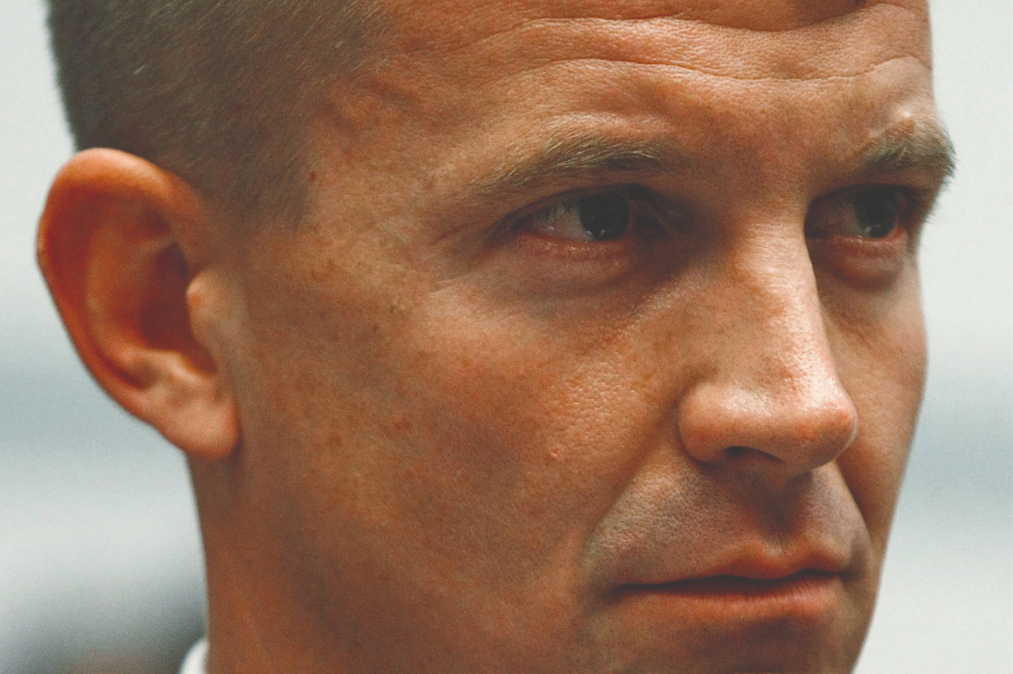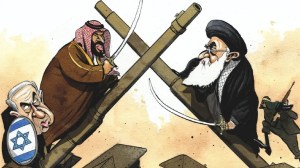‘No modern US war would be complete without the involvement of Blackwater founder Erik Prince,’ wrote journalist Jeremy Scahill in his seminal book Dirty Wars. That was back in 2013. Since its founding in 1997, Blackwater, Prince’s private military outfit, has been reincarnated several times under different names. But Prince has stayed the same.
Iraq, Afghanistan, Libya, Somalia — Prince, a very 21st-century mercenary, has wreaked havoc in all these places. He comes, he spoils, he leaves a mess that is impossible to clear up.
Take Libya. In February, a report commissioned by the United Nations Security Council accused Prince of coordinating Project Opus, an $80-million operation in 2019 to deliver weapons and men to help the militia leader Khalifa Haftar overthrow Libya’s UN recognized government. The operation was ‘partially unsuccessful’ because the men — an assortment of South African, British and Australian mercenaries plus one American — were ultimately unable to deliver Cobra and Little Bird helicopters from Jordan as promised. Project Opus went awry when the men arrived in Benghazi with older attack aircraft from South Africa instead, reportedly sparking Heftar’s fury. The men fled, hopping into speedboats, and were apprehended by police when they reached Malta.
According to the UN report, the plot, purchases and deliveries violate an international arms embargo. When UN investigators dug through 10 shell companies in four countries, their path led to Prince and his longtime associate Christiaan Durrant. Both are facing UN sanctions, including asset freezes and a travel ban. The Blackwater founder, through his lawyer Matthew Schwartz, has categorically denied involvement in the coup-gone-wrong. Schwartz did not, however, respond to requests for comment for this story.
‘It’s no surprise,’ says the Atlantic Council’s Sean McFate, who predicted that the Erik Princes of the world would proliferate in his book The Modern Mercenary: Private Armies and What They Mean for World Order (2014). ‘The civil war in Libya has become the latest mercenary hotspot, and the fighting has gone medieval, with mercenary-on-mercenary battles. No one exactly knows who they work for and why. But one thing is certain: where there is blood money to be made, expect Erik Prince.’ Libya has been mired in violence and political dysfunction since 2011, when the United States, egged on by its Nato partners, conducted airstrikes and helped topple the regime of Muammar Gaddafi. A fragile, power sharing ‘unity’ government was stood up at the start of 2021, but it was inherently unstable. On Heftar’s side, and in many cases supplying fighters and weapons: the UAE, Egypt, Jordan, Saudi Arabia, France (and Russia, via its Wagner Group mercenaries). Defending the UN-recognized Government of National Accord (GNA): Turkey and Qatar.
Then as now, the US has recognized the GNA as Libya’s legitimate government, and pursued a policy of ‘active neutrality’. Washington has been vocal in its opposition to foreign interference of any kind: this makes Prince’s actions even more audacious. The Biden administration has said little about Libya so far, but states on its State Department webpage that it ‘supports an immediate end to Libya’s ongoing conflict through mediation efforts under the United Nations Support Mission in Libya (UNSMIL)’.
Prince was once accused of being a ‘religious crusader’ by his own men. But he appears to value coin and adventure above all. The lure of the Middle East’s roiling battlefields has put him in bed with some of the world’s most unsavory characters, sometimes against his own country’s policies.
Prince came up, for example, in Robert Mueller’s Trump-Russia investigation, where it emerged that he had met with a Russian close to Vladimir Putin, along with Mohammed bin Zayed (aka MbZ), the crown prince and de facto ruler of the United Arab Emirates, at a neutral spot in the Seychelles Islands. ‘Prince was like a kid at Christmas about his meeting with MbZ,’ according to notes from Mueller’s investigators. ‘He could only focus on the presents under the tree.’ Those presents were, according to reports, contracts to help the UAE in its battles in Yemen, Somalia and Libya.
It wouldn’t have been the first time Prince worked with the despotic UAE monarchy. Prince moved to Abu Dhabi in 2010 to avoid a string of lawsuits and potential prosecutions related to Blackwater’s work in Iraq. One of his companies, Reflex Responses, was hired in 2011 to raise a force of several hundred guards for the emir of Abu Dhabi, to ‘assist the UAE government with intelligence gathering, security, counter terrorism and suppression of any revolts’. Meanwhile an outfit he was also connected to reportedly helped to train soldiers in Colombia who were later sent to fight — and die — in the war in Yemen.
The New York Times claimed in 2011 that it was unclear whether any of the outfits connected to Prince had a US license to raise foreign armies. Was Prince skirting his country’s laws? A State Department spokesman told the paper at the time that the government was investigating the circumstances, and that Xe Services (another of Blackwater’s incarnations) had already paid $42 million in fines connected to similar work in Jordan.
As this was going on, Prince had already moved on to the next continent in the US war on terror: Africa. Prince attempted to get into the anti-piracy business in Somalia in 2008. Blackwater even purchased its own 183-foot vessel, the McArthur, to serve as a ‘mothership’ for operations against pirates.
But dogged by legal issues and a discrimination lawsuit, the plan was thwarted. So Prince moved on once more, to Puntland in northern Somalia, and then Mogadishu in 2011. Here, according to Scahill, Prince sat ‘at the top of the management chain of Saracen’, another Blackwater-affiliated mercenary outfit.
Saracen was reportedly funded in part by the UAE and further bankrolled by Prince himself, though he has denied any role in providing its seed money. Saracen started off protecting Somali VIPs in Mogadishu against Islamist rebels, and combating pirates with the UAE-backed Puntland Maritime Police Force. Then UN observers began making noise. They said Saracen had violated arms embargoes and increased levels of violence by antagonizing Somalia’s chief insurgent group, al-Shabaab. Contracts were canceled and Somalia’s leaders turned on Saracen.
That seems to be a familiar tune for Prince. He approaches a conflict zone full of plucky ideas and financial backing — he was said to have come up with the idea for his Somalia anti-piracy project after reading The Pirate Coast, a 2005 bestseller about Thomas Jefferson’s response to the Barbary pirates. When he runs afoul of international authorities and their pesky regulations, he prances off to the next glittering opportunity. Exactly how many countries he has been involved with is anyone’s guess. For every case where the UN has checked his influence, there may have been another government or rebel group willing to take him on.
Of course, the US government was Prince’s first and biggest client. By 2007, Blackwater had received more than $1 billion for its security work in Iraq and Afghanistan, sometimes covertly. (To this day, both the Joint Special Forces Command and the CIA deny that Blackwater was operating with them in Pakistan.) Publicly Blackwater became a black spot for the US in the war-zones, particularly when Blackwater operatives killed 17 civilians and injured 20 in Baghdad’s Nisour Square in 2007. (Before leaving office, Donald Trump pardoned four Blackwater operatives who were serving US jail terms for the massacre.) Among other misdeeds, Blackwater was alleged to have commandeered guns from Afghan troops in 2008 and given them to its own guards. Meanwhile Prince and his people were also accused of overcharging the government, trying to cover up evidence, threatening lives and impeding investigations into multiple accusations against them in Afghanistan and Iraq. By 2009 Blackwater was rebranded as Xe Services. It continued to get federal contracts.
Prince’s latest incarnation, the Frontier Services Group (FSG), has turned its sights on China. Based in Hong Kong, FSG provides security, aviation and logistical services for Beijing’s vastly ambitious Belt and Road projects, particularly its mining efforts in resource-rich Africa. FSG was initially Prince’s baby but then its chief backer, a Chinese investment conglomerate, acquired a 26 percent stake in the company; Prince now serves as deputy chairman. FSG also helped to build and oversee a major facility in Beijing where, according to the Washington Post, ‘trainers with police and military experience teach classes on tackling detainees, handling hostage situations and thwarting terrorist attacks’. FSG’s promotional material boasts that the center has trained more than 5,000 Chinese military personnel, 500 SWAT specialists and 300 overseas military police officers.
FSG faced a backlash when the company announced it was building a similar facility in Xinjiang, where the Chinese government is accused of detaining over a million ethnic Uighurs in ‘reeducation’ prison camps. After objections were raised, the press release duly vanished from FSG’s website. Prince denied any ‘knowledge or involvement whatsoever with this preliminary memorandum’ on FSG’s activities in Xinjiang: ‘Any potential investment of this nature would require the knowledge and input of each FSG Board member and a formal Board resolution.’
So now Prince, a former Navy SEAL who has always traded on his patriotism and Republican bona fides, is do-si-doing with China, which the Biden administration calls America’s ‘pacing threat’ and the new CIA director describes as ‘a formidable, authoritarian adversary’. But the foreign-policy blob in Washington can hardly cry treachery. It made Erik Prince the man he is today.
It was the American government, as part of its global effort to eradicate terror, that invented a new way of war in which nation states outsource conflict and security. Like medieval free companies or privateers with letters of marque, private military services allow governments to wage war away from the glare of the media. And isn’t that so much easier? Mercenaries break rules. They can popup and then vanish quietly. Unlike soldiers who serve their flags in uniform, private forces can fly under the public radar. That means no political price has to be paid for putting boots on the ground and volunteers in harm’s way. ‘But here’s what most people, including four-stars, don’t get about mercenaries. When you privatize war, it changes warfare,’ says Sean McFate. ‘For example, you can bribe the enemy’s mercenaries to defect. [Mercenaries] can also start and elongate wars for profit, and engage in banditry in between contracts. A world with more mercenaries is one with more war and suffering.’ It’s a world Erik Prince has helped to create, and a world in which he can carry on profiting with impunity.
Kelley Beaucar Vlahos is a senior adviser at the Quincy Institute for Responsible Statecraft. This article was originally published in The Spectator’s April 2021 US edition.


















